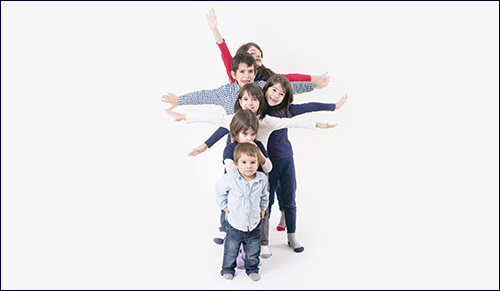 Vampire Weekend's Surprising Jewish Stories
Vampire Weekend's Surprising Jewish Stories


5 min read
The blessing of growing up in a home with many siblings.
“So, do you have kids? How many do you have?”
Working in waspy IT firm, this question was a common ice breaker. Coffee breaks were often spent sharing daily challenges of sleepless nights and debating how to achieve the mythical work-family balance. The three questions were predictable. How many kids do you have? How many do you want? And how many siblings do you have?
The answers, for the most part, were also predictable. Most people had one or two children, and didn’t want more. The director had three girls, but that was only because he wanted a son.
My answer to the third question never failed to raise eyebrows. “You have six siblings?!”
“Yes,” I said proudly. “And I want a large family. I want however many children God will bless us with and we can deal with.”
The US birth rate is the lowest it has ever been. Jewish demographics face the additional threat of exponentially rising assimilation. Assimilation rates of 58% in America put the continuity of the Jewish people at serious risk. So, on a personal, as well as religious, level I see the value of the family unit and having children.
But it was one conversation which moved me the most. “I am desperate for another child,” one colleague confided in me tearfully. “I have a son but my husband is adamant that one is all he wants. He thinks having another child is too expensive.”
My heart broke as she told me this. Growing up in a large family was far from easy. Financially, we were not well off at all. We never went without, but there were no overseas trips and new gadgets and my parents did that best to economize wherever possible. We fought endlessly, and my mother was exhausted for years. I am sure my parents doubted if we would ever grow out of our intense sibling rivalry. But somewhere along the way we matured and became very good friends. We speak almost every day, and will do anything for each other. I even love spending time with them. My siblings are the best people I know; I can’t imagine my life without any one of them.
As I raise my own children and look at the world with adult eyes, I am filled with gratitude for the gifts that growing up surrounded by siblings bestowed upon me. The lessons I learned are invaluable in marriage, parenting, relationships and the workplace:
Each of us has radically different personalities. One sibling is emotional, passionate and outgoing. Another is introverted, level-headed and quiet. Some are musical, some technological and some are social butterflies. Some of us are messy and some of us are fastidiously tidy. We all have very different emotional temperaments and needs. The experience of having to navigate these variations enables me to respect the different psychological make-up of my husband, children, friends and colleagues.
As we gravitate towards people most similar to us, I probably would never have chosen friends like them. But having been given these people as my siblings, I have come to deeply appreciate each of them or their uniqueness, their talents and their quirks. My sister’s social activism inspires me to do my part for society while my brothers’ commitment to Torah learning is a role model.
Being forced to interact with such different personalities can be a big challenge. These differences have tested our relationships; seeing an issue from the other’s point of view is never easy. In the end, we had no choice but to work through these issues, and forgive the misdemeanours and move on.
We still occasionally fight with each other. But at the end of the day, we are family. It is accepted that we can name each other’s’ shortcomings within the family, but in the outside world we will protect and stand up for each other no matter what. We are unconditionally accepted for who we are and don’t have to put on any pretences around each other.
Sometimes a family member is not a morning person. Sometimes they come home after a bad day at work and are stressed, miserable and grumpy. They may snap at you, or slam the door in your face. Likewise, you are not always perfect, and are reactive and say hurtful things. But you learn what it means to be forgiving of family members’ shortcomings, just as they are forgiving of your imperfections. It means making allowances and tolerating imperfection, and not holding grudges.
My memories of Jewish life are synonymous with family life. Shabbat was spent debating current events for hours round the table and sharing words of Torah. Erev Pesach would find each of us working round the clock whether cleaning or cooking. The Passover Seder is never complete without our family jokes from decades back, and reminiscing about the Seders of past years. For me, Jewish holidays equal family time, fun and connection. These shared experiences connect each of us in a meaningful way, no matter where we are currently in the world.
These positive and joy-filled memories form a large part of my emotional connection to Judaism and ensure that our family is committed to being an integral part of Jewish identity. I yearn to create these same cherished memories or my children, and to inspire them carry on the meaningful and Torah-based traditions I was bought up with.
I walk back to my desk and glance at my flashing cell phone. Quips in our family WhatsApp group bring a smile to my face and immediately brighten my day. I return to my work, but not before offering a silent prayer of gratitude to my parents for sacrificing so much to raise us and giving me the gift of a large family.
